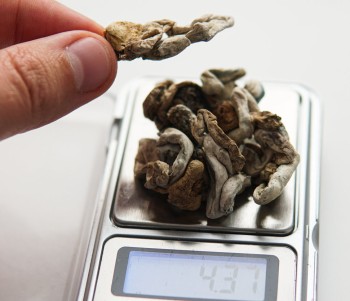
The DEA shouldn’t be in charge of scheduling Marijuana says Jesse Ventura
And he’s not alone!
In a recent development that has caught the attention of cannabis advocates and lawmakers alike, the Drug Enforcement Administration (DEA) has indicated that it is following the necessary procedures in its marijuana rescheduling review.
This revelation came in response to a letter sent by a group of 21 lawmakers from both the House and Senate, urging the agency to promptly deschedule marijuana. The DEA's Acting Chief of Congressional Affairs, Michael Miller, stated in a letter to Senator Elizabeth Warren and others that the agency will "follow the procedures that Congress set forth in the Controlled Substances Act, including an opportunity for a public comment period and a hearing."
While these comments may seem routine, they provide valuable insight into the DEA's potential plans for the coming weeks and months. The mention of a public comment period and hearing is particularly significant, as these steps would only be necessary if the DEA decides to reschedule marijuana from its current Schedule I status. This could mean that the agency is considering either rescheduling marijuana to Schedule III, as recommended by the Department of Health and Human Services, or descheduling it entirely.
If the DEA does choose to reschedule or deschedule marijuana, the public will have a 30-day window to provide comments on the recommendation before it can officially take effect. This opportunity for public input is crucial, as it allows stakeholders, experts, and concerned citizens to voice their opinions and contribute to the decision-making process.
The DEA's acknowledgment that it is carefully following the procedures outlined in the Controlled Substances Act while conducting its administrative review of marijuana's schedule is a positive sign for those who have long advocated for a change in the drug's legal status.
However, the agency's motives and the eventual outcome of this review remain uncertain.
But should the DEA even have the authority to schedule cannabis? This question lies at the heart of the ongoing debate surrounding marijuana policy in the United States. In this article, we're going to explore this idea in detail, examining the arguments for and against the DEA's role in determining the legal status of cannabis.
The Current Rescheduling Circus: A Biden Administration Production
Since the beginning of the Biden Administration's efforts to reschedule marijuana, there have been doubts about the endgame. When they revealed their push for Schedule III, it became apparent that this was a move to grant the pharmaceutical industry control over the cannabis market.
Here's a timeline of the events that have unfolded:
-
Late 2022: President Biden issues an executive order directing HHS to review marijuana's status as a Schedule I drug and provide a recommendation on rescheduling.
-
August 2023: After a year-long review, HHS sends a letter to the DEA requesting that marijuana be moved to Schedule III.
-
September 2023: An anonymous Biden Administration official expresses belief that marijuana will be moved to Schedule III before the 2024 election.
-
October 2023: A bipartisan group of 31 congressmembers sends a letter to the DEA, urging them to consider fully descheduling marijuana.
-
December 2023: HHS releases a 250-page document explaining their rationale for wanting the DEA to reschedule marijuana to Schedule III.
-
January 2024: Colorado Attorney General Phil Weiser leads a group of 12 state attorneys general in sending a letter to the DEA, advocating for rescheduling.
-
February 2024: Speculation about an impending announcement from the DEA begins to circulate.
-
March 2024: President Biden becomes the first president to promote marijuana law reform during a State of the Union address.
-
April 2024: The DEA indicates they are in the process of writing a recommendation, with Administrator Anne Milgram set to make a decision on marijuana's scheduling status.
The most recent development, with the DEA actively working on a recommendation, is significant because it suggests that the agency is closer than ever to potentially rescheduling marijuana.
Historically, the DEA has not been this close to making such a monumental change in cannabis policy.
It's worth noting that the popularity of cannabis legalization has reached an all-time high, and with the November elections looming, Democrats may be doubling down on cannabis reform to secure the significant "cannabis vote" that could sway the outcome of the elections.
However, if cannabis isn't rescheduled or legalized prior to November, there is no guarantee that the Biden Administration won't backpedal or pull a "bait and switch" tactic. The cannabis community must remain vigilant and continue to push for meaningful reform, regardless of the political landscape.
Jesse Ventura: A Champion for Cannabis Reform
Former Minnesota Governor Jesse Ventura has been a long-time advocate for cannabis legalization, and his recent interview with Marijuana Moment highlights his unwavering commitment to the cause.
Ventura's personal experience with the benefits of medical marijuana has fueled his passion for reform, as he credits cannabis with saving his wife's life when she developed late-in-life epileptic seizures.
Ventura's support for cannabis legalization dates back to his gubernatorial campaign, when he openly embraced the issue despite warnings from his party that it could cost him the election. "It didn't hurt me a bit," Ventura said.
"It actually, I think in the end, strengthened me because it showed the public I have balls enough to bring up topics that were real in life and not be the typical politician and sweep them under the rug and run from them."
His success in the election serves as a testament to the fact that people are willing to elect officials who are open about their cannabis use and support for reform. Ventura believes that if he were running for office today, he would make cannabis legalization a top campaign issue to align with the "loyal" base of consumers eager for change.
One of the key points Ventura raised in the interview was his criticism of the Drug Enforcement Administration's (DEA) role in the cannabis rescheduling process. He questioned why the DEA, an enforcement agency, is allowed to make decisions on the legal status of marijuana, stating, "I guess the first thing that I did was I had to scratch my head and go, 'Why is the DEA, the enforcement people, allowed to make the decisions on whether it should be legal or not?'"
Ventura pointed out the inherent conflict of interest in the DEA's involvement, saying, "Excuse me, they have the biggest conflict of interest of anybody on the planet, right? Because if they keep it illegal, that means they stay in business and they get way more money allocated to them by the federal government to continue to go out and bust people for cannabis. How come they're the deciding agency?"
He further emphasized his point by drawing a comparison to law enforcement, stating, "Excuse my French, but that's bullshit. You know, that's like putting the police in charge of lawmaking. You elect people to make laws. The police merely enforce the law. Why are you allowing the enforcer of the law to make the law?"
Ventura's critique of the DEA's role in the rescheduling process highlights the need for a more impartial and evidence-based approach to cannabis policy reform. As support for legalization continues to grow, with a recent poll showing that one in five American adults are regular marijuana consumers, it is crucial that the decision-making process is guided by science and public opinion rather than the interests of enforcement agencies.
As the 2024 presidential election approaches, Ventura believes that embracing cannabis reform could be a winning strategy for candidates looking to secure the significant "cannabis vote." While he acknowledged that President Donald Trump might face pushback from his evangelical base if he were to support legalization, Ventura maintains that the time is right for bold action on cannabis policy.
With his newly launched cannabis brand, Jesse Ventura Farms, the former governor is committed to making a positive impact on the industry and the lives of those who can benefit from medical marijuana. As he continues to champion reform, Ventura's message is clear: it's time for the federal government to catch up with public opinion and end the prohibition of cannabis once and for all.
The Sticky Bottom Line
Jesse Ventura's critique of the Drug Enforcement Administration's (DEA) role in the cannabis rescheduling process is spot on. The fact that the very agency responsible for enforcing drug laws is also tasked with determining the legal status of substances like marijuana is an inherent conflict of interest. As Ventura aptly put it, this arrangement is akin to allowing the police to make the laws they enforce. It's an insane setup that undermines the principles of fairness and impartiality in our legal system, and it's something that America needs to address urgently.
While the potential rescheduling of cannabis to Schedule III might seem like progress, it's crucial to recognize that this move could be primarily a power grab by the pharmaceutical industry. If marijuana remains on the controlled substance act in any capacity, it is still, in essence, illegal. To put this into perspective, we can equate the situation to slavery: descheduling would be akin to liberty, while Schedule III is like having permission to go to town unattended while still being considered someone's property. True progress will only be achieved when cannabis is completely removed from the controlled substance act.
As the 2024 elections approach, it's important for voters to be aware of the games politicians play when it comes to hot-button issues like cannabis legalization. While Democrats may tout their support for reform as a core part of their campaign strategy, it's worth noting that they failed to legalize marijuana despite having majority control over the past four years. This inconsistency should give pause to anyone who believes that campaign promises will inevitably lead to meaningful change.
At the end of the day, the path to genuine cannabis reform is fraught with obstacles, including entrenched interests, political maneuvering, and a lack of political will. As citizens, it is our responsibility to hold our elected officials accountable and demand that they take action to end the failed war on drugs and the unjust prohibition of marijuana.
Only by remaining vigilant, informed, and engaged can we hope to achieve the kind of lasting change that will benefit individuals, communities, and our nation as a whole.
THE DEA STRUGGLES ON CANNABIS, READ ON...
WHY IS THE DEA ARRESTING MORE PEOPLE FOR WEED AFTER LEGALIZATION?






